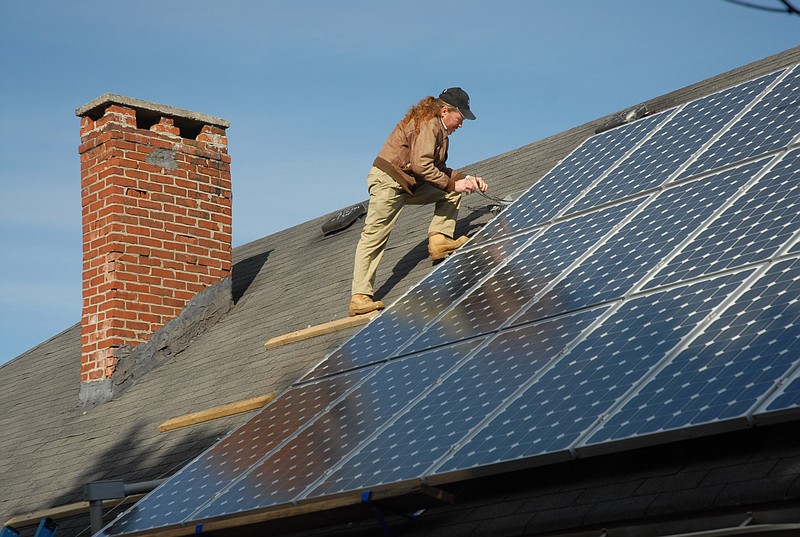It's undeniable that climate change is happening. It's happening all around us, and it's happening right now.
What is also undeniable is that there will be winners, as well as losers.
The question is which will we be? We locally, we regionally and we as a nation.
MarketWatch last week reported on a recent speech by former vice president and Nobel Prize-winning environmentalist Al Gore. In that speech at a banking event, Gore noted that millennials, now well into their careers and building stock portfolios, should see climate change not only as a fearsome future, but also as "the single biggest investment opportunity in history."
"The sustainability revolution has the magnitude of the agricultural and industrial revolutions, but the speed of the digital revolution," Gore said at the fourth annual Deutsche Bank Wealth Management Next Generation Innovation Summit in San Francisco. "This is the battle of your lifetimes, but we can turn the corner in the next 10 to 15 years. And the assets you control can make a huge difference."
But Gore wasn't just talking about short-term shareholder returns at the expense of wider environmental and social costs or depletion of natural resources. We've already seen how this plays out. After all, it wasn't just big oil, but also coal executives, who knew the dire long-term consequences of their business models even in the 1960s but did nothing about it and instead buried their research for decades. Those industries - especially coal - are now going the way of dinosaurs and buggy whips.
Unsustainable companies risk being left behind, Gore told another audience in Nashville just before Thanksgiving as he kicked off a 24-hour, worldwide blitz of climate advocacy dubbed 24 Hours of Reality: Truth in Action.
Clearly, far too many others among us, especially Republicans - and one Republican in particular - still see the solutions for climate change as the end of their oil-heavy and fossil fuel-heavy investments.
As we're quite fond of saying: Follow the money. What stands in the way of saving Planet Earth is not humankind's inability to invent and engineer earth-friendly heat, light, transportation and health care. On the contrary, what stands in the way is denial fueled by a knee-jerk wallet mentality. In other words, greed.
If the old saying "it takes one to know one" is true, then appealing to investors and shareholders about the long-term viability of sustainable energy in order to stabilize climate change may be the most effective tool we have.
We see the positive side of this locally with Volkswagen's move to build electric cars, some of them in Chattanooga. VW, eager to rehabilitate it's reputation after being caught in 2015 perpetrating massive diesel emissions fraud, is now investing big in sustainability - sustainability of the earth and sustainability of VW's corporate image and future profitability.
We also see it in the efforts of local governments and other corporations. In June, Chattanooga city and airport officials celebrated the completion of a solar farm that makes Lovell Field the nation's first airport to produce enough energy to supply all of its daily power needs - the equivalent of enough electricity to power 160,000 light bulbs. The energy made from the $10 million solar farm is sold to TVA and then taken off of the airport's EPB power bill. Federal Aviation Administration grants funded 90% of the project, and Lovell Field invested the remaining $1 million. (Now instead of paying for electricity, the revenue generated by the solar farm will help the airport hold down other fees.)
The airport's solar farm followed a much larger one at VW built in 2012, and last summer BlueCross BlueShield joined the movement, working to install 10,000 solar panels atop its five major office and parking facilities on Cameron Hill.
We see it in the region. In October, the 6-acre Rossville Solar Farm used by TVA and EPB was on a National Solar Tour.
Unfortunately, we also see our regional federal utility, the Tennessee Valley Authority, acting more like the fossil fuel industry - fighting smarter investment by scaling down solar incentives for homeowners and private investors.
We see it nationally in the fact that renewable energy is beating coal on cost across the U.S. - despite the Trump administration's every effort to derail alternative energy innovation and environmental regulation.
"Renewable energy jobs are booming across America, creating stable and high-wage employment for blue-collar workers. By 2025, almost every existing coal plant in the United States will cost more to operate than building replacement wind and solar [farms] within 35 miles of each plant," according to Energy Innovation and Forbes.
It's true that fixing the endless conservative war on climate science demands Democratic victories in 2020. But it's also clear that Americans are wising up and equating climate change fixes with financial savings.
